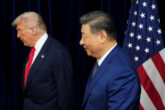December 16, 2022
The Answer to Countering Chinese Influence in Brazil? Sanitation Reform.
Luis Inacio Lula Da Silva, commonly known as Lula, defeated incumbent right-wing president Jair Bolsonaro on October 30 in a race that could have significant implications for Brazil’s role on the world stage. After four years of retrenchment under Bolsonaro, Brazil will seek to reclaim its role as a leading voice for the Global South that characterized Lula’s first two terms in office from 2003 to 2011. In particular, Lula will seek to restore Brazil’s closer links with China that marked his first term, which may have significant implications for both Chinese influence in Latin America and Brazil’s future environmental prospects.
Lula’s presidency presents an opportunity for the Biden administration to strengthen the Brazil-U.S. relationship through increased climate cooperation in the Amazon region.
Lula’s presidency presents an opportunity for the Biden administration to strengthen the Brazil-U.S. relationship through increased climate cooperation in the Amazon region, which is a top priority for both administrations. Biden has thus far publicly championed efforts to reduce Amazon deforestation and should maintain his support. At the same time, the United States should lead international efforts at the 2023 Amazon Summit to invest in the Amazon region’s critically underdeveloped water and sanitation infrastructure. By doing so, the United States can build global support for protecting a less visible component of the Amazon ecosystem and simultaneously present itself to Lula as a stronger partner than China in climate efforts.
While Bolsonaro’s presidency was characterized by harsh rhetoric and strained Brazil-China ties, Lula has promised to restore Brazil’s relationship with China within the first six months of his presidency. From the outset of his term, he may look to the greatest hits of his first presidency as the easiest way to repair Sino-Brazilian ties. His government has pledged to strengthen BRICS, the geopolitical grouping of Brazil, Russia, China, India, and South Africa that Lula helped found in 2009.
Read the full article from The Diplomat.
More from CNAS
-
Chinese Maker of Bitcoin-Mining Machines Is a Security Threat, Says Expert
Bloomberg News reports that a Chinese manufacturer, Bitmain Technologies Ltd, that sells most of the world’s Bitcoin-mining machines — including 16,000 of them to a venture ba...
By David Feith
-
Indo-Pacific Security / Energy, Economics & Security
North Korea’s Provocations, Power Plays, and Shifting AlliancesTensions on the Korean Peninsula have reached a new and dangerous threshold. President Lee Jae Myung is warning of a real risk of accidental military clashes, as the situation...
By Dr. Go Myong-Hyun
-
Indo-Pacific Security / Energy, Economics & Security
How to Win the Economic War with ChinaTrump's approach to China has run aground, giving Beijing unprecedented advantage in the economic conflict....
By Edward Fishman & Julian Gewirtz
-
Indo-Pacific Security / Technology & National Security
Sharper: Tech + ChinaRecent talks between President Donald Trump and Chinese Communist Party General Secretary Xi Jinping placed a spotlight on emerging technologies, from high-end chips to minera...
By Charles Horn & Sevi Silvia




